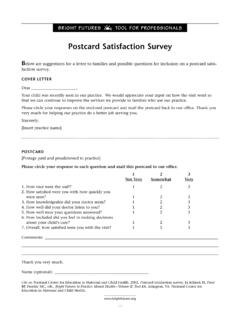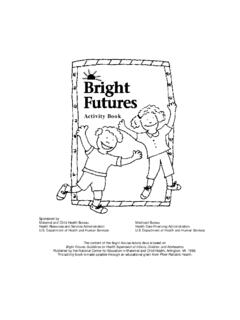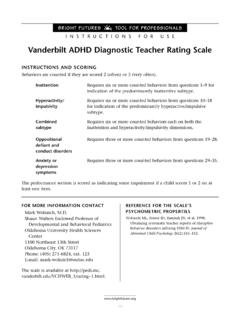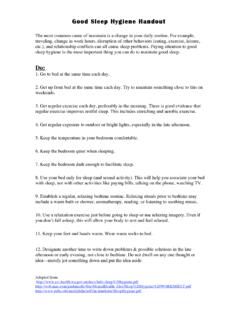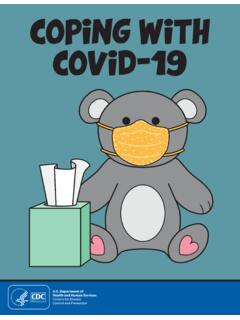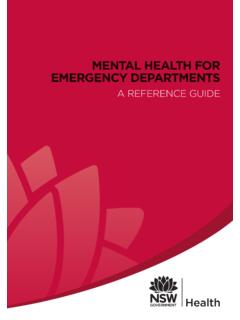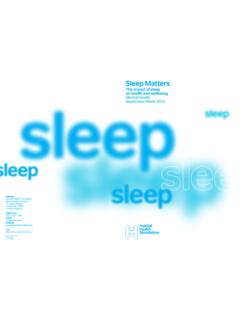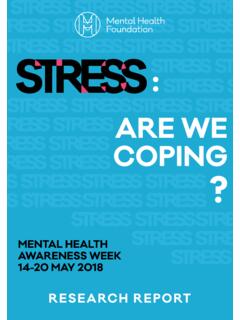Transcription of Pediatric Intake Form - Bright Futures
1 The Pediatric Intake form can be used with each fami-ly entering your care and readministered with low literacy skills or whose first lan-guage is not English may require assistance to completethe the Pediatric Intake form , also known as theFamily Psychosocial Screen, as a whole can help theprimary care health professional develop a generalunderstanding of the history, functioning, questions,and concerns of each addition, specific areas of the Pediatric Intake Formcan be scored to provide further insight into specificareas of a family s DEPRESSIONU nder the heading Family Activities are three ques-tions that screen for parental depression.
2 A positiveresponse to two or more questions is considered a posi-tive screen. For parents with a positive screen, it may behelpful to explore other symptoms of depression such aschanges in appetite, weight, sleep, activities, energylevel, and ability to concentrate; feelings of hopeless-ness; and suicidal ideation (suicidal thoughts) or suicidalintent. Reassuring parents that depression is common ishelpful, as is noting the availability of treatmentoptions provided by mental health professionals andthe positive prognosis for the treatment of depression.(See Bridge Topic: Parental Depression, p.)
3 303.)SUBSTANCE USEU nder the heading Drinking and Drugs are sevenquestions that screen for parental substance abuse. Apositive response to any of the first six questions isconsidered a positive screen. Parents with a positivescreen should be asked about frequency of substanceuse and how their substance use affects their family. Aphysician s advice to quit smoking is often highly effec-tive, but a physician s advice to stop abusing substancesmay be less so. Refer for further assessment and treat-ment as indicated. DOMESTIC VIOLENCEU nder the heading Family Health Habits are fourquestions that screen for domestic violence.
4 A parentwho responds positively to any of these questionsshould receive further assessment and counseling,including exploration of the extent and patterns ofviolence, and discussion of safety issues for childrenand adolescents in the home (including gun storage).A parent may need assistance with making an escapeplan and should be referred to hotlines or professionals should affirm that domestic vio-lence is wrong but not uncommon. Victims needfollow-up visits and ongoing support even if theyreturn to the abuser. Forming a therapeutic relation-ship centered around the child s safety and well-beingis recommended because children and adolescents areat risk for physical abuse in homes where there isdomestic violence.
5 (See Bridge Topic: DomesticViolence, p. 227.)PARENTAL HISTORY OF ABUSEU nder the heading When You Were a Child are eightquestions that screen for parents histories of abuse. Abackground of abuse predisposes parents to disciplinarypractices that may be abusive or too permissive. A posi-tive response to any of the first four questions is con-sidered a positive screen. The last four questions helpgather additional information about disciplinary tech-niques and parents need for counseling or parentingclasses. (See Bridge Topic: Child Maltreatment, p. 213.)SOCIAL SUPPORTSU nder the heading Help and Support are questionsthat screen for social support, a strong factor in reduc-ing life stresses and parenting stresses.
6 Adequate socialsupport helps ensure that parents have appropriatemodels for parenting practices and disciplinary tech-niques. If the parent s answers to the first three ques-tions indicate that she has access to fewer than twosupport persons or that she is less than satisfied withthe support she has, the screen is considered referrals to parenting groups, social work services, Futures TOOL FOR PROFESSIONALS(continued on next page) Pediatric Intake FormINSTRUCTIONS FOR USEhome visitor programs, or community family supportservices. The Pediatric Intake form also assesses a number ofother risk factors for developmental and behavior prob-lems.
7 Risk factors include frequent household moves,being a single parent, having three or more children inthe home, having less than a high school education,and being unemployed. Scoring four or more risk fac-tors, including having mental health problems and anauthoritarian parenting style (observed when parentsuse commands excessively or are negative and less thanresponsive to child-initiated interests), is associatedwith a substantial drop in children s and schoolachievement. In such cases, children should be referredfor early stimulation programs such as Head Start or aquality child care or preschool KJ.
8 1992. Self-administered questionnaire for struc-tured psychosocial screening in pediatrics. Pediatrics89(3):433 KJ, Babonis TR. 1992. Screening for maternal depres-sion in Pediatric clinics. American Journal of Diseases ofChildren146(7):876 KJ, Carlin AS, Buntain-Ricklefs J. 1994. Screening formaternal experiences of physical abuse during Pediatrics 33(6):333 KJ, Greteman A, Bennett E, et al. 1993. Screeningmothers of young children for substance abuse. Journal ofDevelopmental & Behavioral Pediatrics 14(5):308 KJ, Kelleher KJ. 1996. Family psychosocial screening:Instruments and techniques.
9 Ambulatory Child Health1:325 Intake form (continued) Futures TOOL FOR Intake form (continued on next page)Our practice is dedicated to providing the best possible care for your child. In order for us to serve you better, pleasetake a few minutes to answer the following questions. Your answers will be kept strictly confidential as part of yourchild s medical record. Ongoing evaluations of our care may involve chart reviews by qualified persons, but neitheryour name nor your child s name will ever appear in any either the word or the letter for your answer where appropriate.
10 Fill in answers where space is you the child sA. MotherD. Foster parentG. Self (Are youtheB. FatherE. Other relativepatient?)C. GrandparentF. OtherHow many times haveWhere is the child living now?you moved in the lastA. House or apartmentC. Shelteryear?with familyD. OtherB. House or apartmenttimeswith relatives or friendsBesides you, does anyone else take YesNocare of the child? If yes, who? _____Has child received health care elsewhere? YesNoIf yes, what? _____Does the child have any allergies to anyYesNomedications? If yes, what? _____Has the child received any immunizations?
